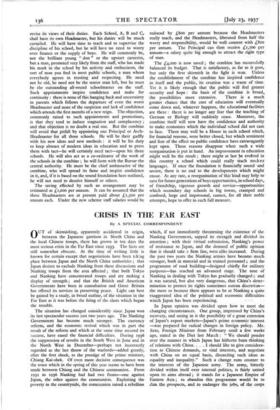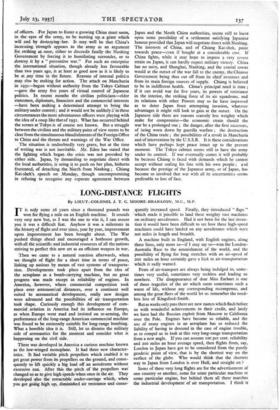CRISIS IN THE FAR EAST
By A SPECIAL. CORRESPONDENT
The situation has changed considerably since Japan won its last spectacular success just two years ago. The Nanking Government has become much stronger. The currency reform, and the economic revival which was in part the result of the reform and which at the same time assured its success, have eased the financial difficulties. During 1936 the suppression of revolts in the South West in June and in the North West in December—perhaps not incorrectly regarded as the last throw of the warlords—added greatly, after the first shock, to the prestige of the prime minister, Chiang Kai-shek. Of even more decisive consequence was the truce which in the spring of this year seems to have been made between Chiang and the Chinese communists. From 1931 to 1936 Nanking had had two fronts—one against Japan, the other. against the communists. Exploiting the poverty in the countryside, the communists raised a rebellion which, if not immediately threatening the existence of the Nanking Government, sapped its strength and divided its attention ; with their virtual submission, Nanking's power of resistance to Japan, and the demand of public opinion that it should take a firm line, were alike increased. During the past two years the Nanking armies have become much stronger, both in material and in trained personnel ; and the programme of road building--designed chiefly for -military purposes—has reached - an advanced stage. The tone of Nanking in dealing with Tokyo has gradually changed•;-- and it was natural, but also very dangerous, that China's deter- mination to protect its rights sometimes outran discretian. the more so because there appears to be at Nanking a quite exaggerated idea of the political and economic difficulties which Japan has been experiencing.
In Japan opinion was divided upon how to meet the changing circumstances. One group, impressed by China's recovery, and seeing in it the possibility 'of a great extension of Japan's export markets—Japan's prime economic interest —was prepared for radical changes in foreign policy: Mr. Sato, Foreign Minister from February until a few weeks ago, stated in the Diet last Match : " We should' ponder over the manner in which Japan has hitherto been,thinking of relations with China. . . I should like to give considera- tion. to Chinese demands, or vital interests, and negotiate with China on an equal basis, discarding such ideas as equality and inequality." Such a change runs counter to the interests of the Japanese army. The army, bitterly divided within itself over internal • politics, is fairly united upon its aims .abroad ; it stands for a Japanese Empire of Eastern Asia; to abandon this programme would be to dim , the- prospects,. and to endanger the jobs, of_ the corps of officers. For Japan to foster- a growing China must seem, in the. eyes of the army, to- be nursing up. a giant which will end by destroying• her. It may well be that China's increasing, strength appears to the army as an argument for striking at once, either to discredit fatally the Nanking Government by forcing it to humiliating surrender, or to destroy it by a " preventive war." For such an enterprise the international situation, though already less favourable than two years ago, is at least as good now as it is likely to be at any time in the future. Reasons of internal politics may also be making for action. The attack on Manchuria in 1931—begun without authority from the Tokyo Cabinet —gave the army five years of virtual control of Japanese politics. In recent months the civilian politicians—elder statesmen, diplomats, financiers and the commercial interests —have been making a determined attempt to bring the military under control ; and it would not be unlikely 2f in these circumstances the more adventurous officers were playing with the idea of a coup like that of 1931. What has occurred behind the scenes at Tokyo is of course not known. But a struggle between the civilian and the military point of view seems to be clear from the simultaneous blandishments of the Foreign Office to China and the threats and warnings of the War Office.
The situation is undoubtedly very grave, but at the time of writing war is not inevitable. Mr. Eden has stated that the fighting which began the. crisis was not provoked by either side. Japan, by demanding to negotiate direct with the local authorities, is using it to push on her plan, hitherto frustrated, of detaching the North from Nanking ; Chiang Kai-shek's speech on Monday, though uncompromising in refusing to recognise any separate agreement between Japan and the North China authorities, seems still to leave open some possibility of a settlement satisfying Japanese honour provided that Japan will negotiate direct with Nanking. The interests of China, and of Chiang Kai-shek, point towards peace—even if bought at a considerable cost. If China fights, while it may hope to impose a very severe strain on Japan, it can hardly expect military victory. China has no navy, and Shanghai, Nanking, and the coastal towns would at the outset of the war fall to the enemy, the Chinese Government being thus cut off from its chief revenues and from its main foreign sources of supply. Chiang is believed to be in indifferent health China's principal need is time ; if it can avoid war for five years, its powers of resistance in the interior, the striking force of its air squadrons, and its relations with other Powers may so far have improved as to deter Japan from attempting invasion, whatever advantages it might still look to gain at the outset. On the Japanese side there are reasons scarcely less weighty which make for compromise—the economic strain should the war be a prolonged one ; the danger, after the first successes, of being worn down by guerilla warfare ; the destruction of the China trade ; the possibilities of a revolt in Manchuria and of intervention by the U.S.S.R. It is these considerations which have perhaps kept peace intact up to the present moment. The Tokyo cabinet seems still to have the army under its control. If war eventually comes it will probably be because Chiang is faced with demands which he cannot accept without sealing his fate with his own people ; aid because the prestige of the Japanese army, or of Japan, has become so involved that war with all its uncertainties seems preferable to loss of face.































































 Previous page
Previous page